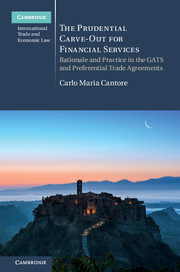 The Prudential Carve-Out for Financial Services
The Prudential Carve-Out for Financial Services Book contents
- The Prudential Carve-Out for Financial Services
- Cambridge International Trade and Economic Law
- The Prudential Carve-Out for Financial Services
- Copyright page
- Dedication
- Contents
- Figures
- Tables
- Acknowledgements
- Abbreviations
- Cited Panel and Appellate Body Reports
- 1 The Subject Matter of the Study
- 2 International Cooperation on Financial Services and Prudential Measures
- 3 The Current Understanding of the GATS PCO
- 4 Prudential Carve-Outs in Preferential Trade Agreements
- 5 A Possible Alternative Approach
- 6 Suggestions for Reform
- References
- Index
4 - Prudential Carve-Outs in Preferential Trade Agreements
Published online by Cambridge University Press: 08 June 2018
- The Prudential Carve-Out for Financial Services
- Cambridge International Trade and Economic Law
- The Prudential Carve-Out for Financial Services
- Copyright page
- Dedication
- Contents
- Figures
- Tables
- Acknowledgements
- Abbreviations
- Cited Panel and Appellate Body Reports
- 1 The Subject Matter of the Study
- 2 International Cooperation on Financial Services and Prudential Measures
- 3 The Current Understanding of the GATS PCO
- 4 Prudential Carve-Outs in Preferential Trade Agreements
- 5 A Possible Alternative Approach
- 6 Suggestions for Reform
- References
- Index
Summary
- Type
- Chapter
- Information
- The Prudential Carve-Out for Financial ServicesRationale and Practice in the GATS and Preferential Trade Agreements, pp. 106 - 167Publisher: Cambridge University PressPrint publication year: 2018


